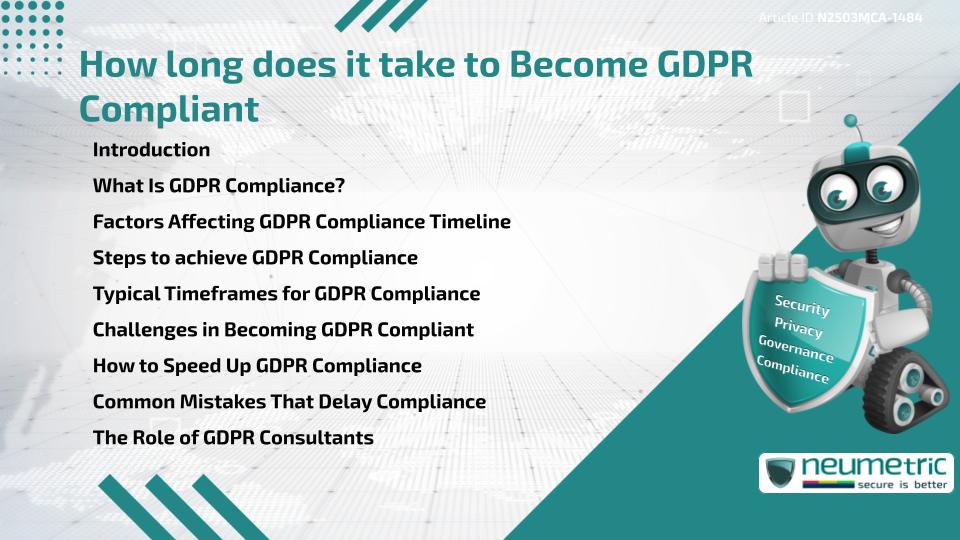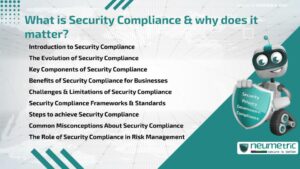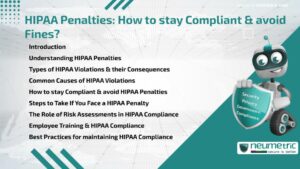Table of Contents
ToggleIntroduction
Becoming compliant with the General Data Protection Regulation [GDPR] is a necessary step for businesses handling Personal Data in the European Union [EU]. However, many Organisations wonder: how long does it take to become GDPR compliant? The timeline varies based on multiple factors, including company size, data processing activities & current Compliance posture. This article explores the key considerations that determine how long the process takes & provides guidance for achieving Compliance efficiently.
What Is GDPR Compliance?
GDPR Compliance refers to an Organisation’s adherence to the data protection & Privacy requirements outlined by the regulation. It ensures that companies implement Security Measures, obtain lawful consent for data processing & uphold individuals’ rights. Failing to comply with GDPR can result in severe penalties, making Compliance a critical business priority.
Factors Affecting GDPR Compliance Timeline
Several factors influence how long it takes to become GDPR compliant:
- Company Size: Larger businesses with complex data structures require more time.
- Data Processing Scope: Companies handling sensitive or large volumes of data need extra measures.
- Existing Policies: Organisations with prior data protection frameworks can achieve Compliance faster.
- Resources: Availability of legal, IT & Compliance teams affects the speed of implementation.
- Third-Party Involvement: Vendors & partners must also comply, potentially adding delays.
Steps to achieve GDPR Compliance
To become GDPR compliant, businesses must follow these steps:
- Conduct a Data Audit – Identify the Personal Data collected, stored & processed.
- Assess Current Compliance – Determine gaps between existing Policies & GDPR requirements.
- Appoint a Data Protection Officer [DPO] – Required for companies processing large-scale Sensitive Data.
- Implement Security Measures – Encrypt, anonymize & protect data against breaches.
- Review Privacy Policies – Update Privacy notices to align with transparency requirements.
- Obtain Consent – Ensure proper consent mechanisms for data collection & processing.
- Train Employees – Educate staff on GDPR principles & responsibilities.
- Establish Data Subject Rights Processes – Enable users to request data access, correction or deletion.
Typical Timeframes for GDPR Compliance
The time required to become GDPR compliant depends on organizational complexity:
- Small Businesses: 3 to 6 months
- Medium Enterprises: 6 to 12 months
- Large Organisations: 12 months or more Companies with existing Compliance measures may complete the process faster, while those starting from scratch may take longer.
Challenges in Becoming GDPR Compliant
Organisations often face hurdles that extend the Compliance timeline:
- Lack of Awareness: Employees unfamiliar with GDPR can slow down implementation.
- Resource Constraints: Limited Financial & human resources can cause delays.
- Complex IT Systems: Legacy infrastructure may require extensive updates.
- Third-Party Dependencies: Vendor Compliance can impact overall readiness.
How to Speed Up GDPR Compliance
Businesses can accelerate Compliance by:
- Assigning Dedicated Teams – Forming a GDPR task force ensures accountability.
- Using Compliance Software – Automating data tracking & reporting reduces manual effort.
- Seeking Expert Guidance – GDPR consultants provide tailored strategies for faster implementation.
- Conducting regular Audits – Monitoring progress helps Organisations stay on track.
Common Mistakes That Delay Compliance
Avoiding these mistakes can prevent unnecessary delays:
- Ignoring Data Mapping – Failure to document data flows can cause setbacks.
- Overlooking Employee Training – Uninformed staff can inadvertently violate GDPR rules.
- Delaying Vendor Assessments – Partner non-Compliance can lead to regulatory Risks.
- Neglecting Ongoing Compliance – GDPR is an ongoing process, not a one-time effort.
The Role of GDPR Consultants
For Organisations struggling with Compliance, GDPR consultants offer:
- Risk Assessments – Identifying Vulnerabilities in data handling.
- Policy Development – Crafting Privacy Policies that align with GDPR.
- Employee Training – Educating staff on regulatory responsibilities.
- Implementation Support – Assisting with technical & legal Compliance measures.
Takeaways
- How long does it take to become GDPR compliant? The timeline varies based on company size, data complexity & preparedness.
- Small Businesses may need 3 to 6 months, while larger Organisations could take a year or more.
- Challenges such as lack of awareness, resource constraints & IT system limitations can slow Compliance.
- Speeding up the process involves using Compliance software, assigning dedicated teams & consulting GDPR experts.
- Avoiding mistakes like ignoring data mapping or vendor Compliance can prevent delays.
FAQ
How long does it take to become GDPR compliant for a Small Business?
Small Businesses typically achieve Compliance within 3 to 6 months, depending on their existing data protection measures & resources.
How long does it take to become GDPR compliant for a large Organisation?
Larger Organisations often require 12 months or more due to complex data structures, third-party dependencies & extensive security implementations.
What happens if my company is not GDPR compliant?
Non-Compliance can result in hefty fines, legal consequences & reputational damage. The maximum penalty is 4% of annual global revenue or €20 million.
Can GDPR Compliance be achieved faster with external help?
Yes, GDPR consultants & Compliance tools can streamline the process by providing expertise & automation, reducing manual effort.
How long does it take to become GDPR compliant if I already have data protection measures?
Companies with existing security frameworks may become GDPR compliant within a few months by addressing minor gaps & aligning with the regulation.
What is the fastest way to become GDPR compliant?
Conducting a Data Audit, leveraging automation, appointing a dedicated Compliance team & consulting GDPR experts can significantly speed up the process.
Is GDPR Compliance a one-time effort?
No, GDPR Compliance requires Continuous Monitoring, periodic audits & regular updates to Policies & Security Measures.
Need help?
Neumetric provides organisations the necessary help to achieve their Cybersecurity, Compliance, Governance, Privacy, Certifications & Pentesting goals.
Organisations & Businesses, specifically those which provide SaaS & AI Solutions, usually need a Cybersecurity Partner for meeting & maintaining the ongoing Security & Privacy needs & requirements of their Clients & Customers.
SOC 2, ISO 27001, ISO 42001, NIST, HIPAA, HECVAT, EU GDPR are some of the Frameworks that are served by Fusion – a centralised, automated, AI-enabled SaaS Solution created & managed by Neumetric.
Reach out to us!





